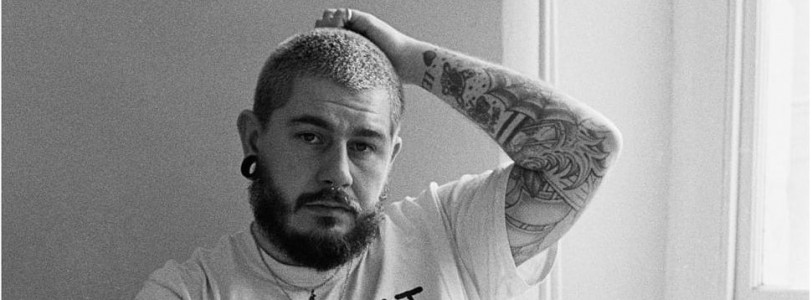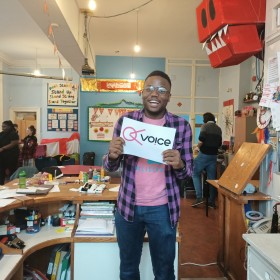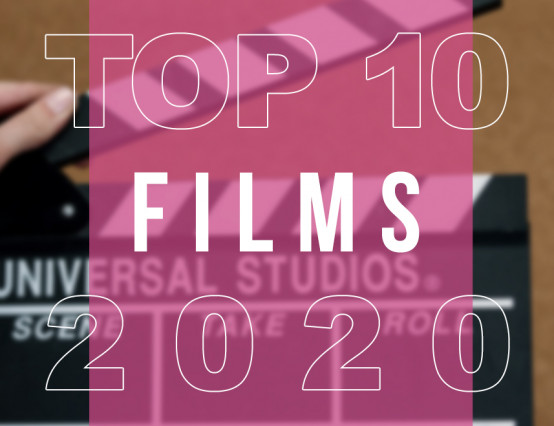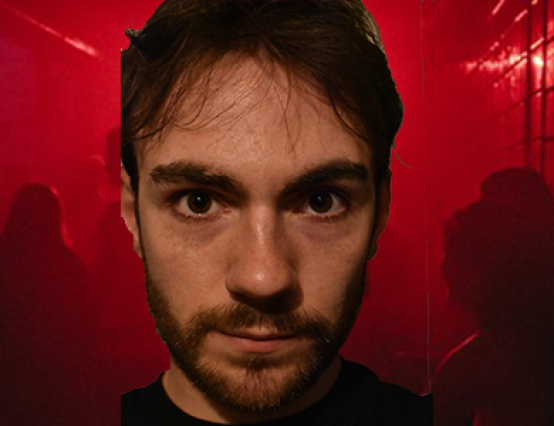Please introduce yourself and the audio piece
I’m 1990s Chris, a queer working-class poet from Hereford. Erasure Island is an experimental audio drama about bisexual/pansexual erasure, told through a modern working-class lens. I wrote the piece for New Creatives, Rural Media and BBC sounds.
What was the creative process behind Erasure Island?
I have wanted to write about the bisexual experience for ages, most of what is in the piece is stuff I feel regularly, so it was brewing. I started the process by interviewing bisexual/pansexual people, four in-depth interviews with people across the gender spectrum. When I write pieces that represent an underrepresented community, I like to get as much input from other people that are in that community too. I know there is privilege in having a platform, I know how rare it is, so I do not want to occupy that space and only consider my experience. I made recordings of the long, intense, emotional conversations, and then made notes. I picked out the themes, let them inform my writing and my considerations. I used direct quotes from the interviews in some of the writing too. In the last poem of the piece, ‘I just don’t want to put anything else between me and you’ is a direct quote from one of the interviews. After a first draft, I heavily edited the work with Deanna Rodger and Audio Executive Producer for New Creatives Paul Dodgson, the latter from the Audio Drama world, the former from the poetry world, and this was integral to the success of the piece.
What were the opportunities and challenges presented by drawing real experiences of different people in a spoken-word piece?
It is hard to edit things into one smooth story when you are trying to represent people's thoughts and feelings that you are so personally connected to, because, a, you feel them too, but b, you have had this proper emotional conversation together. Truly, I shared things with those people, and they shared things with me, that we hadn’t said to anyone before. That’s special, and that makes it precious, which makes it hard to look at from an audience point of view. It is also tricky reflecting the experiences of people who are not male when the piece is told in a male voice, there is certainly a lot of female and AFAB influence in the piece from the interviews and most of the direct quotes in it are not from the one cis-male I interviewed, but the experience is undeniably very gendered - erasure is different based on your assumed gender. On the flip side, I had all this information, all this feeling and all this shared experience to draw from. It was a real product of immersing myself in the content of the interviews and it was a luxury to be able to distance the piece from my own unique experience. It meant I could write something that is essentially fiction but that is so closely based on truth that it connects in that way.
How does spoken word let you tell these stories in a way that other mediums don't?
Spoken word or poetry, which I class as the same thing, is a very immediate medium. I am not afraid to say that I am not in love with poetry, I am in love with stories and communication. Poetry is the most accessible form of storytelling and artistic communication. It does not matter if you can spell, if you know how to use grammar, or punctuation, you can write a beautiful piece of meaningful poetry; I’m dyslexic and I find reading and writing hard! The medium in itself encourages people to be really honest about their feelings, or share their opinions, in a way that other forms of art don’t. For this piece in particular, the use of spoken language mirrors the format of the interviews, it builds on the rich history of working-class oral storytelling and it highlights the context in which people feel most vulnerable about their sexuality - in relation to other people.
How do working-class experiences of queerness differ from other experiences of queerness? Why do you think that is the case?
I am going to focus on the male experience of this because the female or trans experiences of this are very different and I wouldn’t like to speak for anyone. Being a working-class man, being a bloke, and not being straight is very hard to add up. When I think about it, I do not know how to be a working-class queer person. There are no examples for me to follow, so I have to carve my own space out. Obviously, whatever way I do it is, and should be, absolutely fine but that’s not really how the world works. The very few examples of queer men I had growing up were white and middle class, and I had literally no connection to that. If you are middle-class at least you have some social worth to hold on to, and some representations of who you could be on TV but being working class being a blokey bloke is all you have. That’s why we sometimes drink 10 pints and punch each other, because it's our way of proving we have some value - at least we can stomach 10 pints, and we’re harder than Billy from round the corner. I am masculine, I feel masculine, I feel like a bloke but I am not the form of working-class masculinity that is accepted because of my sexuality. For ages I thought I wasn’t actually bisexual because I am not camp. To me it seems a lot of queer men reject their regional accents, as well as using their full given names, to assimilate to middle-class gay culture. I know a lot more gay Davids who speak like the Queen, than I do gay Daves who speak like Barbara Windsor. There is some room to be queer if you are white and middle class, because you can be really successful in other accepted ways, there is not room if you are working class, not white, or both.
Who are some queer/working-class poets we should be following?
These are some working-class writers you should follow, some are queer, some are not, they just make great work:
Travis Alabanza, Joelle Taylor, Scottee, Bridget Hart, Liv Wynter, Maliaka Kegode, TS Idiot, Jamie Thrasivoulou, Danez Smith, Kerry Hudson, Sally Rooney, I also recommend you check out Dead Ink Books, and their collection Know your Place. Oh, and me if you like. I may have missed some, sorry!
Where can people find you online?
@1990schris on Instagram and https://linktr.ee/1990schris
Read our review of Erasure Island here.
New Creatives is a talent development scheme supported by Arts Council England and BBC Arts, delivered in the Midlands by Rural Media. Check out our New Creatives coverage in the New Creatives Voicebox.








0 Comments